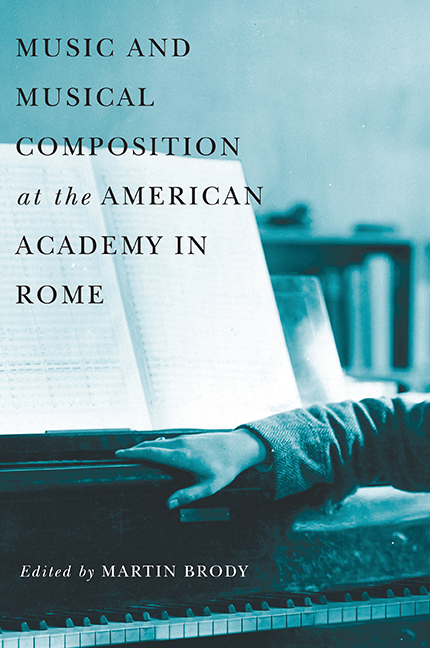Book contents
- Frontmatter
- Contents
- List of Illustrations
- Introduction
- Part One A History of the Rome Prize
- Part Two Origins, Ideology, Patronage
- Part Three Two Case Studies in Internationalism
- Part Four Primary Sources
- 7 What They Said: American Composers on Rome
- 8 The New Music Scene in Rome and the American Presence since World War II: Excerpts from a Roundtable, Moderated by Richard Trythall
- 9 For the Academy
- 10 Two Visits in 1981
- 11 Music Resources at the American Academy in Rome
- Appendix: Composers at the American Academy in Rome, 1921–40
- Selected Bibliography
- List of Contributors
- Index
11 - Music Resources at the American Academy in Rome
from Part Four - Primary Sources
Published online by Cambridge University Press: 25 October 2017
- Frontmatter
- Contents
- List of Illustrations
- Introduction
- Part One A History of the Rome Prize
- Part Two Origins, Ideology, Patronage
- Part Three Two Case Studies in Internationalism
- Part Four Primary Sources
- 7 What They Said: American Composers on Rome
- 8 The New Music Scene in Rome and the American Presence since World War II: Excerpts from a Roundtable, Moderated by Richard Trythall
- 9 For the Academy
- 10 Two Visits in 1981
- 11 Music Resources at the American Academy in Rome
- Appendix: Composers at the American Academy in Rome, 1921–40
- Selected Bibliography
- List of Contributors
- Index
Summary
Several articles in this volume have shed light on the early history of the music program at the Academy. How much of that history is documented at the Academy itself? What can a new fellow in musical composition learn about the work of his illustrious predecessors? How can we ensure that his or her own work here is preserved for the future? As librarian, I have taken a special interest in our music resources since my arrival. These are a well-kept secret, unfortunately: we have some treasures, but on the whole I would characterize our resources as incomplete, dispersed, not fully cataloged, in need of preservation, and underutilized. We have made some progress in documenting our own history, but much more remains to be done. I would like to summarize what is here, what isn't, and what needs to be done.
The music collection originated in 1918 with a gift of over two hundred scores from Kate Freeman Carter, the wife of the Academy director Jesse Benedict Carter. These, and a handful of books on music, were originally kept in the Villa Chiaraviglio, the first home of the new music department of the School of Fine Arts. The music program was presided over by Felix Lamond. The music collection was transferred to the main library in 1932, and promptly relegated to the basement. In 1937–38, several rare music titles came to the library as part of a gift of books from the Rev. Harry de Nancrède, canon of the English Church in Rome. The music collection became a significant scholarly resource, however, only in the late 1970s and early 1980s with the donation of the personal musicological library of Professor W. Oliver Strunk (1901–80, author of Source Readings in Music History and an expert on Byzantine music). After that almost no purchases were made for about a decade, then purchasing resumed on a small scale, using the Randall Thompson Endowment Fund. In 2002 Professor Thomas Forrest Kelly, FAAR 1986, RAAR 2002, a musicologist from Harvard University, helped us update our collection, using special funds from the Department of Education.
- Type
- Chapter
- Information
- Music and Musical Composition at the American Academy in Rome , pp. 285 - 288Publisher: Boydell & BrewerPrint publication year: 2014

